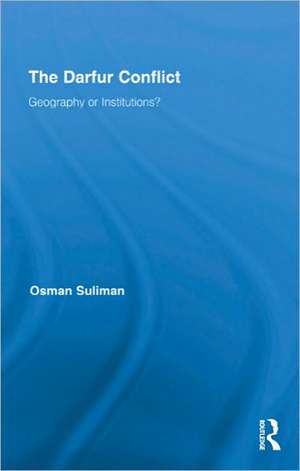The Darfur Conflict: Geography or Institutions?: Routledge African Studies
Autor Osman Sulimanen Limba Engleză Hardback – 8 noi 2010
Din seria Routledge African Studies
-
 Preț: 152.79 lei
Preț: 152.79 lei -
 Preț: 324.87 lei
Preț: 324.87 lei - 26%
 Preț: 819.90 lei
Preț: 819.90 lei -
 Preț: 422.58 lei
Preț: 422.58 lei - 18%
 Preț: 1005.80 lei
Preț: 1005.80 lei -
 Preț: 449.41 lei
Preț: 449.41 lei -
 Preț: 390.63 lei
Preț: 390.63 lei -
 Preț: 416.22 lei
Preț: 416.22 lei -
 Preț: 434.25 lei
Preț: 434.25 lei - 18%
 Preț: 1000.27 lei
Preț: 1000.27 lei -
 Preț: 436.14 lei
Preț: 436.14 lei - 42%
 Preț: 209.80 lei
Preț: 209.80 lei -
 Preț: 449.41 lei
Preț: 449.41 lei -
 Preț: 449.41 lei
Preț: 449.41 lei - 18%
 Preț: 997.11 lei
Preț: 997.11 lei - 18%
 Preț: 1061.93 lei
Preț: 1061.93 lei - 18%
 Preț: 1001.07 lei
Preț: 1001.07 lei -
 Preț: 413.94 lei
Preț: 413.94 lei -
 Preț: 410.07 lei
Preț: 410.07 lei - 22%
 Preț: 191.02 lei
Preț: 191.02 lei - 18%
 Preț: 1116.94 lei
Preț: 1116.94 lei -
 Preț: 442.68 lei
Preț: 442.68 lei -
 Preț: 451.32 lei
Preț: 451.32 lei - 16%
 Preț: 312.91 lei
Preț: 312.91 lei -
 Preț: 449.41 lei
Preț: 449.41 lei - 31%
 Preț: 765.90 lei
Preț: 765.90 lei - 18%
 Preț: 1110.81 lei
Preț: 1110.81 lei - 18%
 Preț: 1000.87 lei
Preț: 1000.87 lei -
 Preț: 409.48 lei
Preț: 409.48 lei -
 Preț: 412.41 lei
Preț: 412.41 lei - 15%
 Preț: 420.64 lei
Preț: 420.64 lei - 31%
 Preț: 763.81 lei
Preț: 763.81 lei - 28%
 Preț: 829.74 lei
Preț: 829.74 lei - 25%
 Preț: 826.32 lei
Preț: 826.32 lei - 30%
 Preț: 848.93 lei
Preț: 848.93 lei
Preț: 850.73 lei
Preț vechi: 1217.59 lei
-30% Nou
Puncte Express: 1276
Preț estimativ în valută:
162.81€ • 176.78$ • 136.76£
162.81€ • 176.78$ • 136.76£
Carte tipărită la comandă
Livrare economică 22 aprilie-06 mai
Preluare comenzi: 021 569.72.76
Specificații
ISBN-13: 9780415885980
ISBN-10: 0415885981
Pagini: 248
Ilustrații: 7 b/w images, 28 tables, 4 halftones and 3 line drawings
Dimensiuni: 152 x 229 x 18 mm
Greutate: 0.62 kg
Ediția:1
Editura: Taylor & Francis
Colecția Routledge
Seria Routledge African Studies
Locul publicării:Oxford, United Kingdom
ISBN-10: 0415885981
Pagini: 248
Ilustrații: 7 b/w images, 28 tables, 4 halftones and 3 line drawings
Dimensiuni: 152 x 229 x 18 mm
Greutate: 0.62 kg
Ediția:1
Editura: Taylor & Francis
Colecția Routledge
Seria Routledge African Studies
Locul publicării:Oxford, United Kingdom
Public țintă
Postgraduate and UndergraduateCuprins
1. Background and Introduction. Appendix to Chapter 1: A Selective List of the Main Articles of the Darfur Peace Agreement 2. Geography. 3. The Impact of the Conflict on Livelihoods. Appendix to Chapter 3: Qabilahs Included in the Sample 4. Poor Governance and Institutional Failures: An Overview. Appendix to Chapter 4. 5. Ecology and Environmental Degradation 6. Failure of Economic Institutions: Development Projects 7. Economic Institutions: Marketing and Credit Markets 8. Land Tenure/Use Problem: Conflict between Customary and Statutory Laws 9. The Breakdown of Local Institutions: Native Administration 10. Social Institutions and the Sudanese Identity Crisis 11. Democratic Institutions and Federalism: Will They Support Power-Sharing? 12. Concluding Remarks. Appendix to Chapter 12: Sudan People’s Initiative.
Recenzii
"...worthwhile for those interested in Darfur, Sudan, and developing countries in general."—Recommended in CHOCE, August 2011, J. E. Weaver, Drake University, USA
Descriere
Although it is often simplified as an "ethnic conflict" in popular media, the current crisis in Darfur can only be superficially defined across ethnic lines. This project diverges from previous studies by addressing how the underlying social and environmental influences such as changing resource dynamics, expanding poverty, lack of infrastructure, and political corruption have brought the crisis to a head. Analyzing the interplay of these factors will yield valuable insights as to how a concerned international community can both end the tragic genocide and address the underlying injustices that engendered it.
